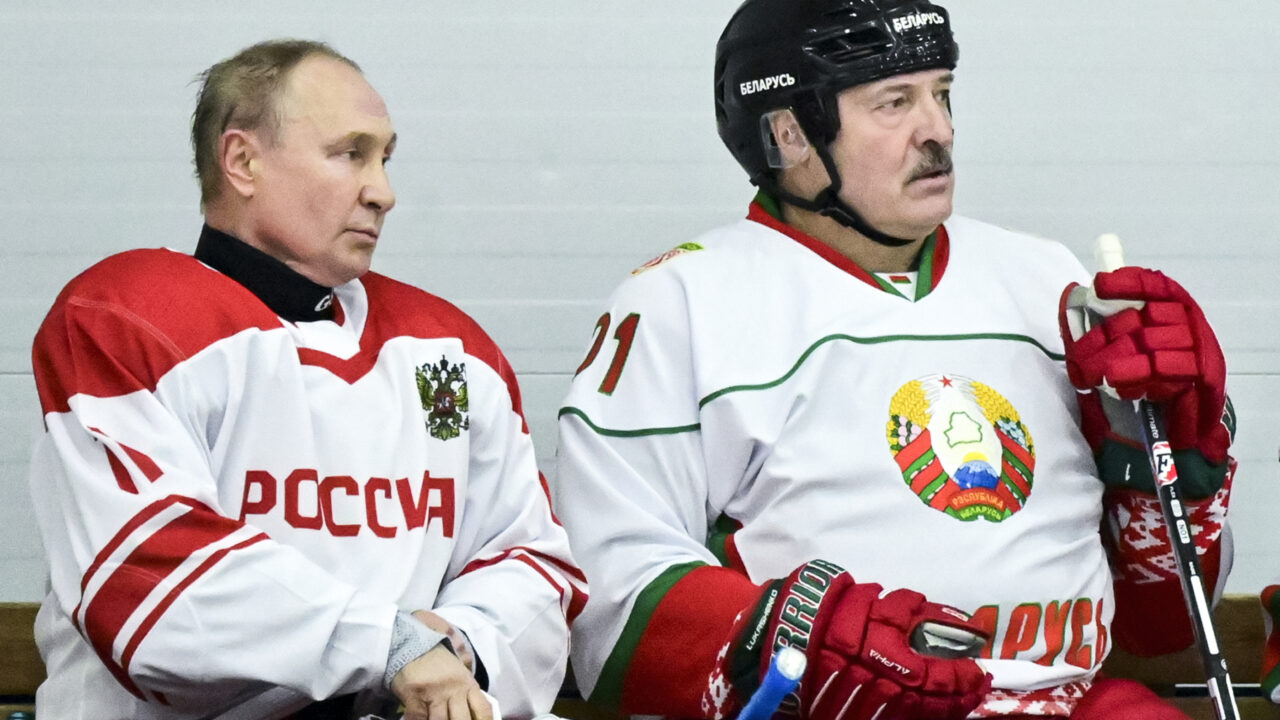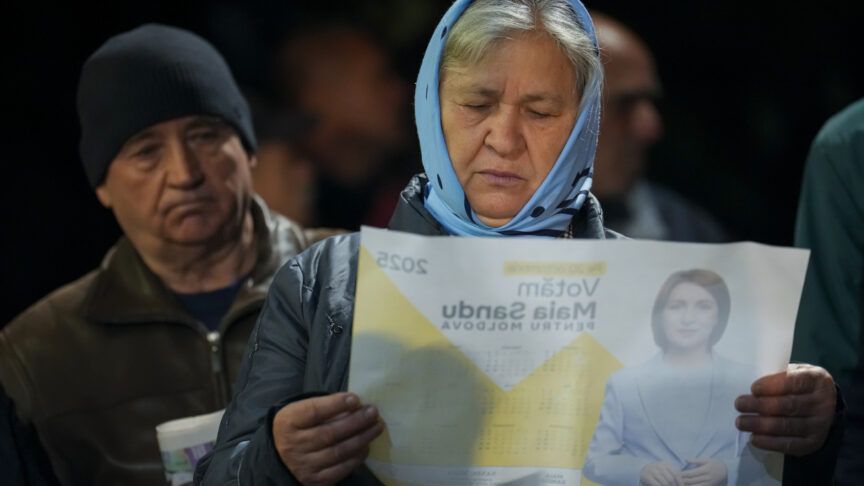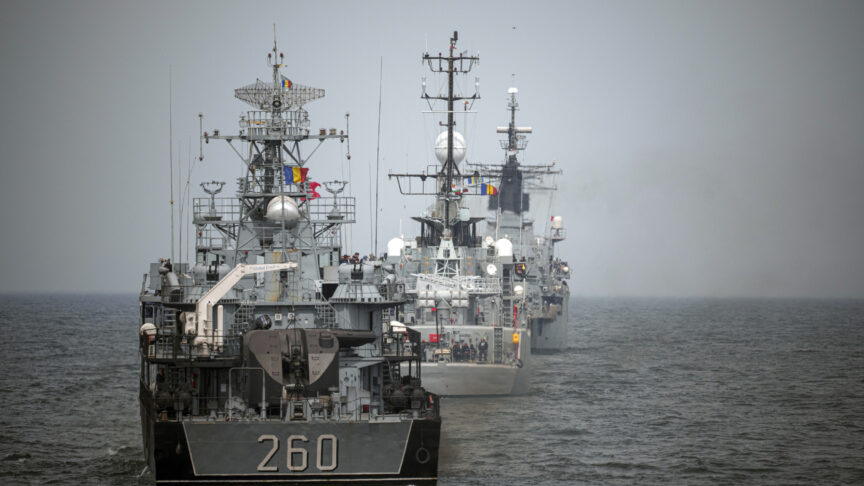How to train your dictator: Putin’s control over Lukashenka
Lukashenka is complicit in Russia’s war on Ukraine. But this should not stigmatise members of the Belarusian democratic movement – who need more support than they are receiving
Belarus was one of only five states to vote against the 2 March UN Resolution condemning Russia’s invasion of Ukraine. Russian troops advancing from Belarusian territory are now closing in on Kyiv. Belarusian leader Alyaksandr Lukashenka has turned his country into a co-aggressor. But he has done so while trying to put his regime’s interests first – and this has drastically reduced his room for manoeuvre.
After rigging a presidential election and beginning a brutal crackdown on popular protests in 2020, Lukashenka found himself in deep international isolation. He survived only thanks to the support of Russia – but initially delayed negotiations with President Vladimir Putin over the price of this assistance. Lukashenka has been particularly reluctant to surrender key economic assets to Russia. He is also clinging to the levers of power: the security forces, the bureaucracy, and state-owned companies. Yet he has little freedom to set his country’s military and foreign policy.
Lukashenka had a completely different reaction in 2014, when Putin’s Russia first invaded Ukraine. Fearing a similar threat to his country’s territory – and, of course, his own power – he diversified his foreign policy options. The Belarusian capital became home to the Minsk process, while his diplomats argued that their country was a “regional security donor”.
This time, any such pretensions have collapsed. Lukashenka’s limited space for decision-making was clear in his phone call with French President Emmanuel Macron on 26 February: the latter’s request for Russian troops to withdraw from Belarus fell on deaf ears.
In early February, 30,000 Russian troops moved into Belarusian territory – purportedly for military exercises. It has since become clear that they were, in fact, preparing for an invasion. And, on 20 February, the last day of the planned exercises, Moscow announced that the troops would be staying. Regardless of whether Putin informed Lukashenka of his plans, the Belarusian authorities were complicit in the intimidation of Ukraine and the West.
On 17 February, before the invasion began, Lukashenka had scoffed at statements by the United States about the date of the attack and called Western intelligence “useless”. At a special press conference on 16 February, Belarusian Foreign Minister Uladzimir Makei even joked that the event was timed to coincide with the Russian invasion.
When Russia attacked Ukraine, Lukashenka admitted that he was providing all necessary assistance to Russian troops. Most of the Russian military contingent in Belarus became part of the invasion force. According to US reports, by 3 March, 70 of the 480 missiles Russia had fired at Ukraine came from Belarus. And the Russian military regularly transports dead or wounded troops through Homel, in Belarus.
On 2 March, the European Union declared that the Lukashenka regime was “supporting the Russian military aggression against Ukraine – inter alia – by allowing Russia to fire ballistic missiles from the Belarusian territory, enabling transportation of Russian military personnel and heavy weapons, tanks, and military transporters, allowing Russian military aircraft to fly over Belarusian airspace into Ukraine, providing refuelling points, and storing Russian weapons and military equipment in Belarus.” And in a statement issued at a special meeting of the Permanent Council of the Organization for Security and Co-operation in Europe, the EU underlined that the regime, “as co-aggressor, bears full responsibility for the loss of life, injuries and destruction”.
Lukashenka had a completely different reaction in 2014, when Putin’s Russia first invaded Ukraine
Despite numerous reports that the Belarusian army will join the invasion, this has not happened yet. However, as Russian forces are advancing much more slowly than Moscow or Minsk expected (Lukashenka predicted that the war would be over in “three to four days”), additional forces would be useful for an assault on Kyiv. Either Putin is still hoping that his army will be enough, or Lukashenka – staring into the abyss that awaits the Belarusian economy – has persuaded him not to ask.
On 11 March, Ukrainian Defence Minister Oleksii Reznikov warned that Ukrainian intelligence had information about a Russian false flag operation to justify an invasion by Belarusian troops. A few hours later, Ukrainian fighters allegedly shelled targets in Belarusian territory. The fact that Lukashenka was in Moscow that day, where he held talks with Putin, only added to the tension. However, the Belarusian Ministry of Defence quickly denied that the shelling had taken place and stated that Belarusian troops remained in Belarus.
It is easy to understand why Lukashenka has no desire for Belarus to fall under the same Western sanctions as Russia. Belarus is already under Western sanctions related to the Lukashenka regime’s rigged 2020 election and subsequent human rights abuses. And Putin is now less able to compensate Belarus for any further sanctions it comes under, even if they are not as robust as those imposed on Russia. It is damaging enough that the West closed loopholes in pre-existing sanctions – such as most of those relating to potash exports – and, on 9 March, excluded several Belarusian banks’ from the SWIFT financial messaging system.
Lukashenka does not represent the Belarusian public. According to a Chatham House poll conducted between 20 January and 9 February 2022, 56 per cent of Belarusians wanted their country to take a neutral stance in any war between Russia and Ukraine. Only 13 per cent wanted to send troops to support Russia, while 58 per cent opposed that course of action. A new poll taken after Russia’s full-scale invasion of Ukraine revealed even lower levels of support for the war: just 3 per cent of Belarusians wanted the Belarusian army to enter the conflict on Russia’s side. Since late February, more than 1,000 people have been arrested at anti-war protests in Belarus, despite the severe repression that Belarusian society has experienced since summer 2020.
There is a danger, however, that the West’s current solidarity with Ukraine will trump its previous support for the Belarusian opposition. Indeed, the Belarusian democratic movement may find it harder to gain attention. Its leader, Sviatlana Tsikhanouskaya, recently declared that “this is no longer an internal crisis – this is a war in which Belarus turned out to be a participant” and dissociated the Belarusian people from the regime’s actions.
Belarusian political exiles have not received the same level of empathy and solidarity as Ukrainian refugees in the EU. Some recently displaced Belarusian citizens have been afraid to visit refugee centres and, at times, have even hidden their nationality. Their Ukrainian bank accounts are frozen. In turn, only 400 Ukrainian refugees initially travelled to Belarus, compared to more than a million who entered Poland.
On 27 February, Lukashenka held a referendum on changes to the Belarusian constitution. He claimed that there had been a turnout of 78.6 per cent – with 82.9 per cent in favour of the changes and 12.8 per cent opposed to them (the remainder of the votes were invalid). The amended constitution – under which “the Republic of Belarus rules out military aggression with its territory in relation to other states” – came into force on 15 March. While Lukashenka has announced that it will take two years to implement the changes, this is a ruse to buy time while he considers how to stay in power. These amendments are aimed at neither democratisation nor the consolidation of reform. Their main objective is to create personal insurance for Lukashenka when the succession process begins. The new constitution will provide him with a multi-layered defence after stepping down. However, in the new reality created by Russia’s full-scale invasion of Ukraine, he will likely try to postpone this process indefinitely rather than risk an uncertain fate.
His decisions on the future – his own and that of the political system, as well as a probable political transition in Belarus and integration with Russia – will depend on the course of Putin’s war on Ukraine. One thing is certain: Lukashenka will prioritise his own safety and welfare over his country’s independence and the will of its people.
The European Council on Foreign Relations does not take collective positions. ECFR publications only represent the views of their individual authors.



